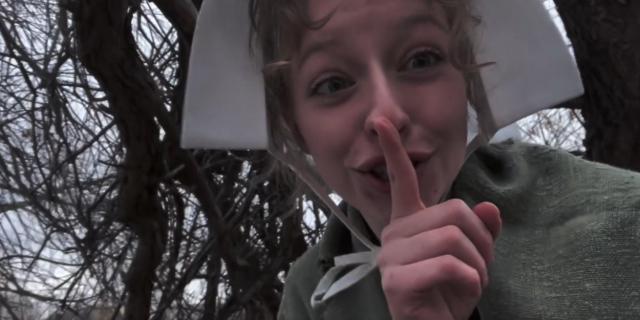

Family-friendly First Stage, one of the country’s leading theaters for young audiences, continues its all-virtual season with an audio production of the Arthur Miller classic, The Crucible. For children old enough to embrace a modern-day “radio show” format, this is a wonderful way to exercise their imaginations.
Written in 1953, The Crucible is a fictionalized account that captures the fear, mass hysteria, and horrific consequences of the Salem, Mass. witch trials of 1692-93. Miller wrote the play as an allegory to the then-current McCarthy anti-Communist hearings. Viewed through a more recent lens, the play is equally relevant to the 2020-21 levels of political fervor fueled by the highest levels of American government. Despite its ancient time period, The Crucible describes an atmosphere that certainly calls to mind the forces leading to the Capitol incidents of January 6, 2021, in Washington, DC.
The First Stage production opens with a short, well-crafted video of young girls dancing in a wintry forest. They are wearing Puritan-style garments of the colonial period, and their long black skirts swish about their ankles as they twirl and laugh. The girls’ white-bonneted heads hold back long curls, which also bounce in the breeze. It is a visual memory that evokes one of the show’s basic themes: innocence. But as the scenes play out, this innocence eventually yields to the darker forces of suspicion, guilt, pride, and dishonor.
The play, starring E.G. Marshall, originally opened on Broadway in 1953 at the Martin Beck Theater. It won the Tony Award for Best Play, and Miller also received a Pulitzer Prize. The initial reviews were mixed, though, a fact Miller blamed on the direction. A year later, a new production appeared that received a much warmer reception. The play has since been lauded as one of the greatest American plays of all time.
First Stage’s cast includes more than 20 members of the Young Company Performance Project, which is directed by longtime Milwaukee acting veteran Matt Daniels. In press materials, Daniels points out that performing the play gives these students an opportunity to do deep historical research beforehand. They also are becoming familiar with one of the most-performed American plays.
Daniels and the play’s director, Ann Joseph-Douglas, do an excellent job of training the young actors to convey their characters’ personalities through voice alone. The excellent sound work (credit to Rick Sims) also brings the production to life. Many sound effects punctuate the action.
Getting back to the cast, these young performers also are adept at using language terms common to that period. In order to differentiate the characters, some of the actors add a Scottish brogue to their lines. In general, the boys do an admirable job of lowering their voices to the pitch of adult men. The girls have a more difficult challenge, tackling characters ranging from a 10-year-old to adult women.
The most easily recognizable voice is that of Daisha Lafford, who plays a Barbadian-born resident named Tituba. The musical shadings of Lafford’s voice perfectly capture the character’s tone, age and background. Tituba, one of the play’s central characters, provides some of the rare moments of comic relief.
All the young actors do a fine job, including Sam Brower as John Proctor, Trevor Schmitt-Ernst as Rev. Parris, Selma Rivera as Ann Putnam, Jeana Bormett as Betty Parris, Costello Mylott as Thomas Putnam, and Madison Uphoff as Deputy Gov. Danforth.
The Crucible is being presented as a combination of live performances and recorded performances (the recorded versions are available later in the play’s run). First Stage managers are to be commended for attempting a multitude of online entertainment forms in these difficult times. Specifically, the company staged one play in the form of a weekly serial mystery, in which clues were enticingly doled out each week. In another production, online viewers were invited to cast votes during each of the live performances. Depending on the outcome of each vote, the actors continued accordingly. (As with The Crucible, those who chose to see a play later in the run watched a pre-recorded version). One is eager to see what other avenues First Stage will attempt this season, as live theater continues to be put on pause during the pandemic.
Since children who watch The Crucible are surely unfamiliar with the format of radio plays, one might suggest that they read a synopsis of the play beforehand. This will help children keep track of the play’s events for the show’s almost two and one-half hour running time (intermission included). As the play is presented, a variety of black-and-white drawings appear on the screen. The drawing for Act I represents the town of Salem, for instance.
Ticketholders for this production also can view a one-sheet cast list. It might be a good idea to print out this list prior to listening to the show. Young listeners may even want to “follow along” with the play by pointing their finger at the name of whichever character is speaking. This would give children a valuable visual cue. And with a cast of slightly more than 20 members, it may help young listeners concentrate throughout the whole production.
Playwright Arthur Miller uses powerful, yet nuanced language to represent the conflicting forces within the small town of Salem. First Stage and its
talented cast/designers allow listeners to hear this tale in a way they perhaps have not yet encountered.
